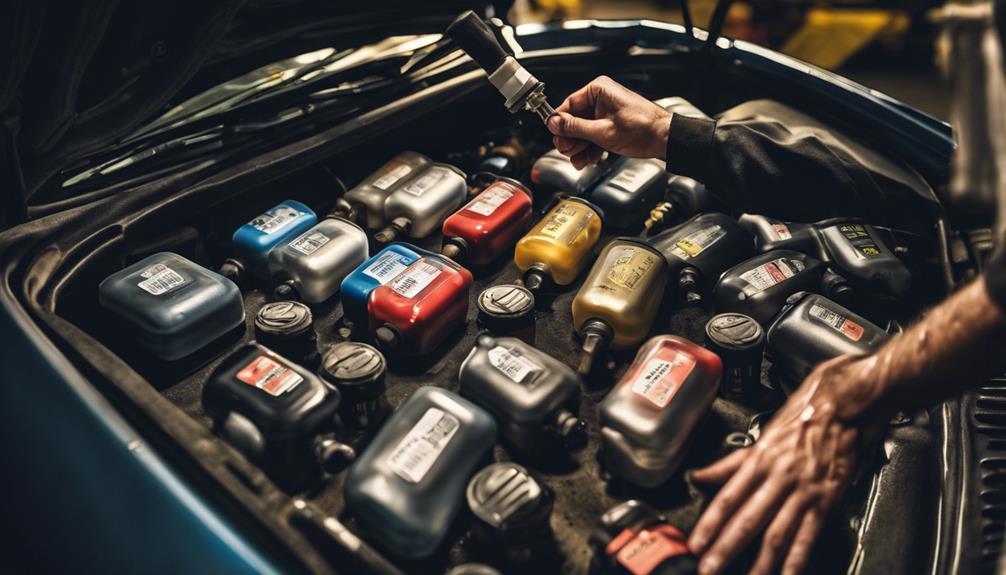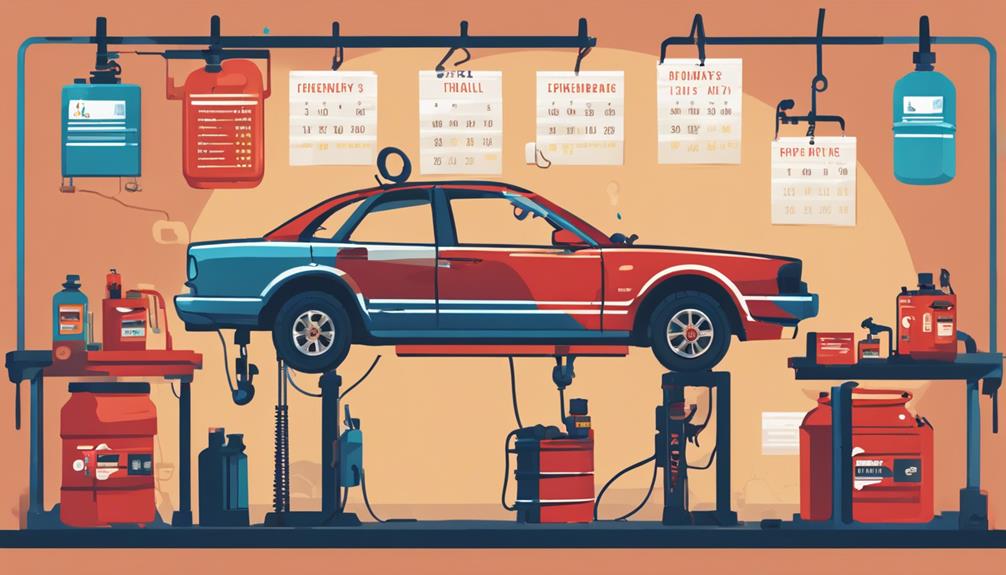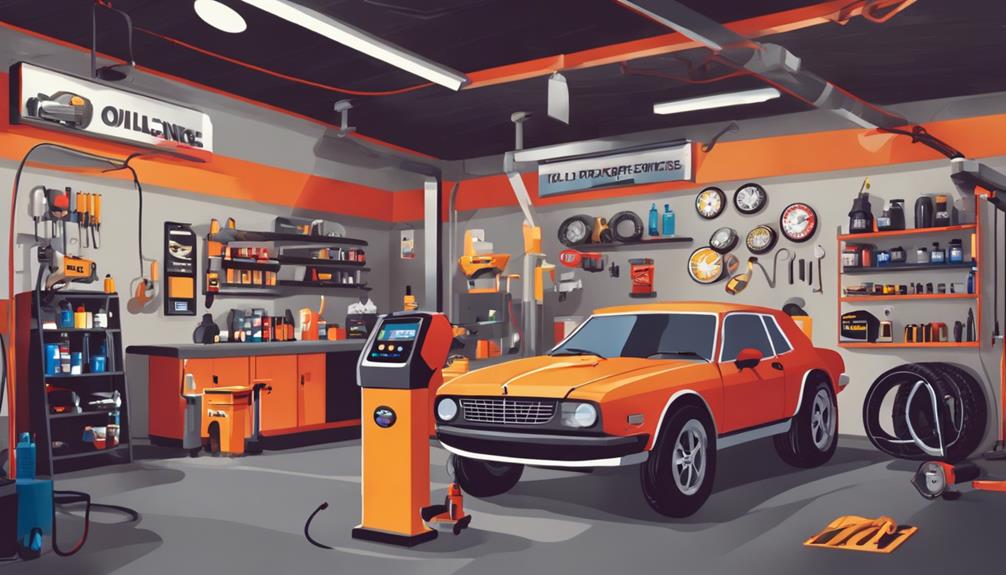If you're looking for an oil change in Brownsville, you're making a smart choice for your vehicle's health. Regular oil changes keep your engine running smoothly and efficiently by reducing friction and heat. You'll need to decide between conventional and synthetic oil based on your vehicle's age and driving conditions. It's recommended to change your oil every 3,000 miles, or to follow your Oil Life Monitoring System. Local services often offer additional options like tire rotation and multi-point inspections, ensuring your car stays in top shape. Stick around to uncover all the details that can enhance your vehicle care.
Key Takeaways
- Brownsville offers several local oil change locations that cater to various vehicle needs and preferences.
- Regular oil changes are essential for maintaining engine longevity and performance, ideally every 3,000 miles.
- Choose between conventional and synthetic oil based on your vehicle's age, driving conditions, and performance requirements.
- Many local services provide added benefits, such as tire rotation and brake services, increasing overall vehicle safety.
Importance of Regular Oil Changes
Regular oil changes are important for keeping your engine running smoothly and extending its lifespan, so don't overlook this essential maintenance task. You might've heard some oil change myths suggesting that you can wait longer between changes or that all oils are the same. In reality, sticking to a regular schedule offers significant oil change benefits that can't be ignored. Clean oil lubricates your engine parts, reducing friction and heat buildup, which is essential for peak performance.
Not only does fresh oil help your engine run efficiently, but it also improves fuel efficiency and overall health. When you neglect oil changes, you risk engine damage and costly repairs down the line. Following your manufacturer's recommendations isn't just a suggestion; it's crucial for maintaining your vehicle's performance and longevity.
Choosing the Right Oil

When it comes to choosing the right oil for your vehicle, understanding the differences between conventional and synthetic options is essential. Each oil grade offers unique benefits that can directly impact your engine's performance and lifespan. By considering factors like your driving conditions and the recommendations from your Oil Life Monitoring System, you can make an informed decision that keeps your engine running smoothly.
Types of Engine Oil
Selecting the right engine oil is crucial for maintaining your vehicle's performance and longevity, as it directly impacts everything from fuel efficiency to engine protection. Here are some key considerations when choosing engine oil:
- Conventional Oil: Best for older vehicles with lower mileage, providing basic engine lubrication.
- Synthetic Oil: Offers enhanced performance and better resistance to temperature extremes, making it ideal for more demanding conditions.
When you're considering engine lubrication, think about how you drive. If you've made performance upgrades to your vehicle, synthetic oil could be the way to go, as it can handle the increased demands. It's designed to give your engine the support it needs, especially under stress. However, if you own an older model that's been well-maintained, conventional oil might still serve you well.
Ultimately, the choice between these types of oil boils down to your specific vehicle needs, driving habits, and whether you're aiming for peak performance or standard maintenance. Making the right decision now can yield benefits in the future.
Oil Grade Importance
Understanding oil grades is important for ensuring your engine runs smoothly and efficiently, as each grade is designed to meet specific performance needs and protect against wear and tear. When it comes to oil grade selection, you'll want to evaluate options like conventional, synthetic, and full synthetic oils. Each provides varying levels of protection and performance. For example, ACDelco Gold Conventional Oil serves well for standard needs, while ACDelco dexos1 Full Synthetic and Mobil 1 Full Synthetic offer enhanced protection for high-performance demands.
Choosing the right oil grade can greatly impact your engine's longevity, efficiency, and overall health. By understanding the unique benefits of each oil type, you can make informed choices that lead to smoother rides and fewer repairs down the line. Remember, your Oil Life Monitoring System (OLMS) is a useful tool to help determine the ideal time for an oil change based on your driving conditions.
Ultimately, recognizing the significance of oil grade is important for maximizing the oil change benefits and keeping your engine in top shape. So, next time you think about an oil change, don't overlook this crucial aspect!
Synthetic Vs. Conventional Oil
Choosing between synthetic and conventional oil can have a significant impact on your vehicle's performance and maintenance costs. Understanding the differences helps you make an informed choice that aligns with your driving habits and vehicle needs.
- Synthetic oil offers superior engine protection and longer change intervals.
- Conventional oil is more affordable and works well for older vehicles.
When considering oil change benefits, synthetic oil stands out with its ability to withstand extreme temperatures and resist breakdown, enhancing engine efficiency. If you drive a high-performance vehicle or frequently tackle tough conditions, synthetic may be your best bet. However, for older cars with simpler engine designs, conventional oil can provide a cost-effective solution without sacrificing performance.
In terms of cost comparison, while synthetic oil is pricier upfront, its longevity and protective qualities can result in lower maintenance costs over time. Evaluating your vehicle's needs and your driving patterns will guide you toward the right oil choice, ensuring your engine runs smoothly and efficiently for years to come.
Multi-Point Vehicle Inspection

A thorough Multi-Point Vehicle Inspection can reveal key details about your car's health, guaranteeing it runs smoothly and safely on the road. This inspection is essential for vehicle safety, as it covers multiple important components. For instance, it checks the remaining engine oil life percentage, helping you determine when an oil change is needed.
Tire wear is also assessed to maintain proper alignment and overall condition, which can greatly impact your driving experience. Plus, wiper blades and windshield glass are inspected to uphold optimal visibility, particularly in adverse weather conditions.
Fluid levels, like brake and windshield washer fluids, are checked and topped up, supporting your vehicle's preventative maintenance. A thorough review of the brake system, including lines, hoses, and the parking brake condition, is key for ensuring safe braking performance.
Battery and OnStar Inspection

When you bring your vehicle in for an oil change, it's important to include a battery and OnStar inspection. You'll want to make sure your battery is in good health and that all connections are secure to prevent any unexpected breakdowns. Plus, confirming your OnStar system subscription guarantees you stay connected when you need it most.
Battery Health Evaluation
During a battery health check, you'll not only receive a thorough visual inspection of your battery connections but also verify that your OnStar system is properly subscribed and functioning. This process is essential for maintaining peak battery performance and preventing unexpected breakdowns.
- Confirms battery connections are secure and free from corrosion.
- Identifies potential leaks and concerns in essential vehicle systems.
As part of your vehicle's battery maintenance routine, diagnostic testing plays a key role in evaluating the overall health of your battery. By examining both the battery and the OnStar system together, you're making a proactive choice for your vehicle's reliability. This evaluation helps pinpoint any issues before they escalate, ensuring your car runs smoothly and efficiently.
OnStar System Verification
Verifying the OnStar system during the battery inspection not only confirms your subscription is active but also enhances your vehicle's overall safety and connectivity. When you confirm that your OnStar subscription is up-to-date, you're investing in peace of mind. The OnStar system provides essential features, including emergency assistance and navigation support, making connectivity verification a critical part of your vehicle's maintenance.
During this inspection, technicians don't just check the battery; they also assess all crucial systems that rely on your OnStar service. By visually inspecting battery connections, they help prevent unexpected breakdowns that can disrupt your daily routine. The process allows for early detection of any potential issues, ensuring your vehicle remains reliable and safe on the road.
In a world where staying connected is key, the OnStar system plays a pivotal role. Regular verification of your subscription ensures that you're never left in the dark, literally and figuratively. So, make sure to prioritize this aspect of your vehicle's maintenance. It's more than just an inspection; it's about enhancing your driving experience and embracing the safety that comes with connectivity.
Visual Component Inspection
A thorough visual component inspection not only assesses your battery's health but also guarantees that your OnStar system is fully functional, safeguarding your vehicle's performance and connectivity. This inspection is important for ensuring that all major components are operating at their best, contributing to your overall driving experience.
- Prevent unexpected breakdowns: Regular checks can help you spot issues before they escalate.
- Ensure emergency readiness: A functional OnStar system means you're never alone in a crisis.
During the inspection, your battery's connections are visually assessed, confirming their component functionality and preventing potential electrical issues. Additionally, your OnStar subscription is verified, ensuring you have access to emergency services when needed. By addressing these aspects, the inspection not only enhances your vehicle's safety but also offers significant inspection benefits, promoting a longer lifespan for your car. So, don't overlook this essential step; make it a routine part of your vehicle maintenance. Trust in this process, and you'll drive with assurance, knowing your vehicle is ready for whatever lies ahead.
Recommended Oil Change Frequency

To maintain your engine running smoothly, it's crucial to adhere to the recommended oil change frequency, which is typically every 3,000 miles. Ignoring this can lead to engine wear and costly repairs.
Here are some oil change frequency tips to help you upkeep your vehicle:
| Factor | Recommendation |
|---|---|
| Driving Conditions | Change oil every 3,000 miles or every 3 months for severe conditions. |
| Vehicle Age | Older vehicles may necessitate more frequent changes. |
| Oil Type | Synthetic oil can prolong intervals; refer to your manual. |
| Oil Life Monitoring | Utilize OLMS to assess when to change oil. |
Following engine maintenance recommendations, such as routinely checking your oil level and condition, can notably enhance your engine's longevity and fuel efficiency. Remember, aspects like driving habits and climate can impact how frequently you should change your oil. So, refer to your owner's manual and stay proactive. It's all about maintaining your vehicle in top condition, ensuring you and your loved ones feel secure on the road. By adhering to these guidelines, you'll nurture a deeper connection with your vehicle and boost its performance for years to come.
Additional Services Offered

In addition to oil changes, Jiffy Lube offers a range of essential services designed to keep your vehicle running at peak performance. You'll find that these services not only enhance your car's longevity but also guarantee your safety on the road. Here are some of the key offerings:
- Tire rotation to encourage even wear and extend tire life.
- Transmission fluid exchange to ensure smooth gear shifts and efficient function.
By taking advantage of these services, you're not just maintaining your vehicle; you're also fostering a deeper connection with your ride. A well-maintained car can greatly enhance your driving experience, making each journey safer and more enjoyable. Jiffy Lube's team of professionals is dedicated to providing personalized care, making sure that your car receives the attention it deserves.
Whether you need a quick tire rotation or a detailed inspection of your transmission fluid, Jiffy Lube is here to help you feel secure and confident in your vehicle. Trust in their expertise, and you'll belong to a community of drivers who prioritize quality and care for their cars.
Local Oil Change Locations

Finding a convenient oil change location in Brownsville, TX is made easier with several accessible options that not only cater to your vehicle's needs but also fit your busy lifestyle. When you're juggling responsibilities, you don't want to spend hours waiting for an oil change. Fortunately, local spots offer quick service, often with drive-thru convenience, so you can get in and out without a hassle.
These local oil change locations provide various benefits, such as timely maintenance that can extend your vehicle's lifespan and improve performance. Plus, you'll often find local deals that make routine care more affordable. Some places even offer repair services alongside oil changes, ensuring you can handle multiple needs in one visit.
If you manage a fleet of vehicles, certain locations have specialized programs tailored for businesses, streamlining the process even further. For added convenience, many of these shops allow you to sign up for SMS updates and notifications, keeping you informed about your vehicle's needs. With all these options, finding a trustworthy oil change provider in Brownsville has never been easier.
Frequently Asked Questions
How Can I Tell if My Oil Needs Changing?
To tell if your oil needs changing, monitor oil change intervals and frequency. Check the color and consistency, listen for engine noise, and follow your owner's manual for recommendations to achieve peak performance.
What Are the Signs of Low Oil Levels?
You'll notice signs of low oil levels through warning lights on your dashboard and strange noises from the engine. Ignoring these can lead to serious engine damage, so regular maintenance is vital for your vehicle's health.
Can I Use Synthetic Oil in Older Vehicles?
Sure, using synthetic oil in older vehicles might seem like asking a cat to swim. Yet, it actually enhances engine performance and compatibility, providing benefits like better protection, fuel efficiency, and cleanliness—who wouldn't want that?
How Much Does an Oil Change Typically Cost in Brownsville?
The cost of an oil change varies widely. Consider doing a cost comparison for different services. Keep maintenance tips in mind, and explore DIY options to save money while ensuring service quality for your vehicle.
Do I Need an Appointment for an Oil Change?
Did you know that 70% of people prefer walk-in availability for oil changes? You won't need an appointment, so you can skip the long waiting times and get back on the road quickly, enjoying the convenience.